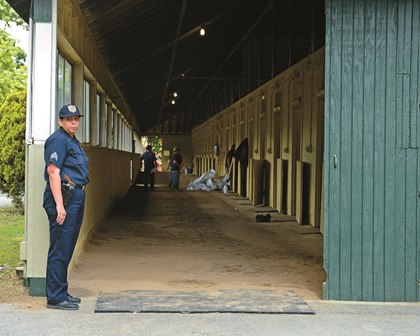
From TheHorse.com
The New York State Gaming Commission (NYSGC) and the New York Racing Association (NYRA) have announced enhanced security protocols for horses running in the four $1 million-plus stakes races on Belmont Stakes day, June 7.
All horses potentially participating in the Knob Creek Manhattan, the Ogden Phipps, the Metropolitan Handicap, and the Belmont Stakes must be on the Belmont Park grounds, in Elmont, New York, by noon on June 4 and will be subject to out-of-competition testing.
According to a May 21 release, trainers of horses participating in those races must provide complete veterinary records for three days leading up to the race. Additionally, horses will be monitored at all times from their arrival at the track leading up to the races.
The NYSGC and NYRA have mandated the following protocols and steps for horses participating in the June 7 stakes races, including the Belmont Stakes:
The commission will take out-of-competition blood samples of horses competing in the races and send them to the New York State Equine Drug Testing and Research Program at Morrisville State College for immediate testing. The commission will coordinate with other jurisdictions to obtain out-of-competition samples from horses not stabled in New York. • Horses participating in the races must be on the grounds by noon on June 4 before the race. Any exceptions will be at the discretion of the stewards.
Horses will stay in their trainers’ current barns and stalls on the grounds, which will be monitored at all times by additional security personnel.
Security personnel will monitor all treatments performed by veterinarians. All containers for medications administered will be retained by the commission for possible testing.
A full daily veterinarian’s record of all medications and treatments given to horses participating in these races from noon on June 4 until the June 7 race will be provided to the commission. Any changes to treatment must be disclosed to the commission. If medications and treatment records are not provided to the commission prior to treatment, veterinarians will not be permitted to treat the horse until the issue is resolved. The commission will post these records on its website each day leading up to the races.
Entry-exit logs will be maintained by additional security from NYRA and the commission. All persons—including veterinarians, trainers, assistant trainers, farriers, owners, or other connections—on entering the stall or engaging in contact with the horse or performing any service for the horse, must have a valid commission license on their person. Such persons will be logged in by security personnel with the reason for their visit. Routine stall and horse maintenance by identified grooms and staff will be monitored but will be exempt from logging.
All equipment, feed, hay bales, etc. are subject to administrative searches and checks.
As is current policy, furosemide (Salix or Lasix) administration will take place in the horses’ own stalls by a NYRA veterinarian. Syringes will be preserved by the commission for possible testing. • On June 6, no veterinarians will treat horses without first making an appointment with commission investigators.
The commission, in conjunction with NYRA, will appoint a single 24-hour point person each day for trainers and connections to contact in case of an emergency.
No treatment will be permitted (beyond Lasix for specifically designated horses) June 7 unless it is for an emergency or as approved by the stewards.
On June 7, horses participating will be required to be in the assembly barn between 45 minutes to 1 hour before post time for TC02 (total carbon dioxide) testing. They will then be escorted with security to the paddock.
Horses in the races will receive priority for paddock schooling with security present.
The NYSGC and NYRA will provide educational materials on the protocols to horsepersons, connections, veterinarians, security and all appropriate parties prior to and upon arrival at the track.
“The commission’s commitment to equine health and safety is underscored by these measures, which are consistent, comprehensive, and fair,” said NYSGC acting executive director Robert Williams. “These races, which will feature some of the top Thoroughbred horses in the world, will be run with the utmost security and integrity.”
Scott Palmer, VMD, Dipl. AVBP, New York equine medical director, added, “These measures highlight best practices and adherence to New York’s rules and regulations. Combined with comprehensive out-of-competition testing, these measures preserve the integrity of the sport in New York and the safety and well-being of the horses running in these prominent races.”
NYRA president Chris Kay said, “In addition to the Belmont Stakes day enhanced protocols, NYRA and the gaming commission have made additional significant investments in integrity and safety programs. These include the hiring of the first ever NYRA safety steward and New York state equine medical director, the hiring and training of security personnel to monitor backstretch activities, and the establishment of an Equine Safety Committee of the NYRA Board of Directors.”
Jockey Club president Jim Gagliano noted, “The Jockey Club applauds the New York State Gaming Commission and The New York Racing Association for all of the security protocols that have been put in place for Belmont Stakes day. We are continuously and aggressively advocating for medication reform, and it’s extremely reassuring to know that out-of-competition testing will be conducted and that trainers will be submitting three days’ worth of veterinary records for their horses on one of our sport’s most visible days.”
Finally, New York Thoroughbred Horsemen’s Association president Rick Violette Jr. said, “New York’s horsemen readily embrace measures that ensure a level playing field and an equal standard of supervision. We are committed to preserving the integrity of racing and protecting the horses and the riders.”
Originally published on BloodHorse.com.
